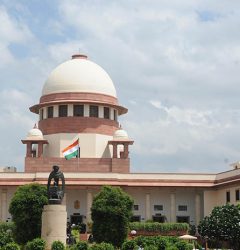New Delhi | The Supreme Court on Wednesday asked the central government why it cannot constitute a committee to examine the impact of free gifts given by political parties to motivate voters. Along with this, the top court said that the government can also call an all-party meeting to investigate the matter.
Justice Hima Kohli and Justice CT Ravikumar accompanied by Chief Justice (CJI) N. A bench headed by V. Ramana asked Solicitor General Tushar Mehta, representing the Centre, “Why can’t the Indian government constitute a committee to study the effect of freebies?” To this, Mehta replied that the Center would help in every matter and the manner and the data and other information related to the issue could be placed before the apex court.
Mehta said a line should be drawn where someone says ‘please don’t do this’. The Chief Justice, while answering the question, said who would be the head of the committee. Justice Ramana said that if he contests the election, he will not get even 10 votes, as political parties matter more and not individuals.
Senior advocate Vikas Singh, representing the petitioner, submitted that retired apex court judges like Justice R. Lodha should be the chairman of the committee to look into the issue of freebies. To this, the CJI replied, “A person who retires or is about to retire has no value in this country.” Singh said that it is the personality of the person concerned, which affects.
Senior advocate Arvind Datar, representing the Election Commission of India, questioned the definition of a freebie and said that if there is something in the manifesto, can it be called a freebie? Datar said there is enough material available to assess the economic impact of free gifts.
The bench held that freebies can destroy the economy. This has to be seen and the court cannot just pass an ordinance.
The Chief Justice said, “The Government of India can call an all-party meeting.”
Pointing to the political parties seeking to intervene in the matter in the court, Mehta said that the parties claim fundamental rights, and what will the government do? The Aam Aadmi Party (AAP) sought to intervene in the matter, claiming that it has a fundamental right to freedom of expression under Article 19 of the Constitution, which includes election speech and promises for the upliftment of Dalits.
Singh submitted that the 2013 judgment of the apex court in Subramaniam Balaji v. Government of Tamil Nadu needs to be reconsidered. In this judgment, the apex court had held that the promises made by political parties in the election manifesto would not amount to ‘corrupt practice’ as per Section 123 of the Representation of the People Act.
After hearing detailed arguments, the top court adjourned the hearing of the matter.
The top court was hearing a PIL by advocate Ashwini Kumar Upadhyay, seeking direction from the Center and the Election Commission of India to take steps to regulate election manifestos of political parties and voting by political parties. The practice of giving or promising free gifts to motivate voters was also opposed during the period.
In the previous hearing, the apex court had suggested setting up an expert panel comprising representatives from the central and state governments, opposition political parties, Election Commission of India, Finance Commission, Reserve Bank of India, NITI Aayog, etc.
